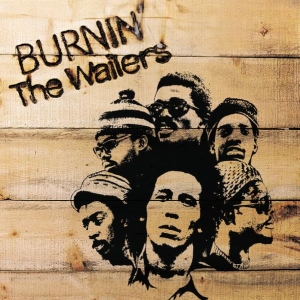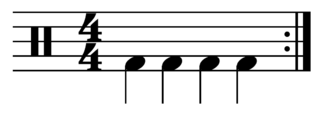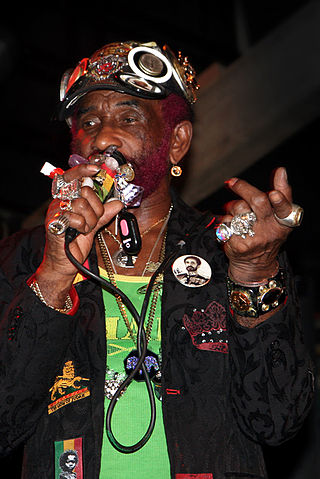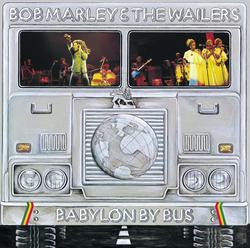Examples
An instructive example of this drum beat is Bob Marley and the Wailers' song "One Drop" which talks about this rhythm.
Examples of songs using the one drop from Bob Marley and the Wailers' album Legend , with Carlton Barrett on drums, include: "No Woman, No Cry", "Three Little Birds", "Get Up, Stand Up", "Waiting in Vain", "Stir It Up", "One Love/People Get Ready", and "I Shot the Sheriff". [3] Other examples include Peter Tosh's "Legalize It", Steel Pulse's "Higher Than High", and Bob Marley's "Exodus". [8] Also The Upsetters's "One Step Dub" (1976) and Bob Marley & The Wailers's "Crazy Baldhead" (1976). [13]
Examples of songs using the steppers from Legend include: "Is This Love", "Exodus", "Buffalo Soldier", "Satisfy My Soul", "Jamming". [3] Other examples include Burning Spear's "Lion". [8]
The one drop style has also been used and referenced in numerous non-reggae songs, including "Lucille Has Messed My Mind Up" by Frank Zappa, "The Spirit of Radio" by Rush, and "You Enjoy Myself" by Phish all placing their own twist on the one drop rhythm. [14]

Reggae is a music genre that originated in Jamaica in the late 1960s. The term also denotes the modern popular music of Jamaica and its diaspora. A 1968 single by Toots and the Maytals, "Do the Reggay", was the first popular song to use the word reggae, effectively naming the genre and introducing it to a global audience. Reggae is rooted out from traditional Jamaican Kumina, Pukkumina, Revival Zion, Nyabinghi, and burru drumming. Jamaican reggae music evolved out of the earlier genres mento, ska and rocksteady. Reggae usually relates news, social gossip, and political commentary. It is instantly recognizable from the counterpoint between the bass and drum downbeat and the offbeat rhythm section. The immediate origins of reggae were in ska and rocksteady; from the latter, reggae took over the use of the bass as a percussion instrument.
Rocksteady is a music genre that originated in Jamaica around 1966. A successor of ska and a precursor to reggae, rocksteady was the dominant style of music in Jamaica for nearly two years, performed by many of the artists who helped establish reggae, including harmony groups such as the Techniques, the Paragons, the Heptones and the Gaylads; soulful singers such as Alton Ellis, Delroy Wilson, Bob Andy, Ken Boothe and Phyllis Dillon; musicians such as Jackie Mittoo, Lynn Taitt and Tommy McCook. The term rocksteady comes from a popular (slower) dance style mentioned in the Alton Ellis song "Rocksteady", that matched the new sound. Some rocksteady songs became hits outside Jamaica, as with ska, helping to secure the international base reggae music has today.

Exodus is the ninth studio album by Jamaican reggae band Bob Marley and the Wailers, first released in June 1977 through Island Records, following Rastaman Vibration (1976). The album's production has been characterized as laid-back with pulsating bass beats and an emphasis on piano, trumpet and guitar. Unlike previous albums from the band, Exodus thematically moves away from cryptic story-telling; instead it revolves around themes of change, religious politics, and sexuality. The album is split into two halves: the first half revolves around religious politics, while the second half is focused on themes of making love and keeping faith.

Burnin' is the sixth album by Jamaican reggae group the Wailers, released in October 1973. It was written by all three members and recorded and produced by the Wailers in Jamaica, contemporaneously with tracks from the Catch a Fire album with further recording, mixing and completion while on the Catch a Fire tour in London. It contains the song "I Shot the Sheriff". It was the last album before Marley, Peter Tosh and Bunny Wailer decided to pursue solo careers, while continuing their local releases through their company Tuff Gong Records. A commercial and critical success in the United States, Burnin' was certified Gold and later added to the National Recording Registry, with the Library of Congress deeming it historically and culturally significant.

Kaya is the tenth studio album by the Jamaican band Bob Marley and the Wailers, released in 1978. The album consists of tracks recorded alongside those released on the Exodus album. It was produced by the band.

Bob Marley and the Wailers were a Jamaican ska, rocksteady and reggae band. The founding members, in 1963, were Bob Marley, Peter Tosh, and Bunny Wailer.

Four-on-the-floor is a rhythm used primarily in dance genres such as disco and electronic dance music. It is a steady, uniformly accented beat in 4
4 time in which the bass drum is hit on every beat . This was popularized in the disco music of the 1970s and the term four-on-the-floor was widely used in that era, since the beat was played with the pedal-operated, drum-kit bass drum.

The Upsetters was the name given to the house band for Jamaican reggae producer Lee "Scratch" Perry. The name of the band comes from Perry's nickname of Upsetter, after his song "I Am the Upsetter", a musical dismissal of his former boss Coxsone Dodd.

Babylon by Bus is a live album released by Bob Marley and the Wailers in 1978. The tracks on this album are considered, with two exceptions, to be from the Pavillon de Paris concerts over 3 nights, 25–27 June 1978, during the Kaya Tour, though there are discrepancies in the track listing.

Aston Francis Barrett, CD, often called "Family Man" or "Fams" for short, was a Jamaican musician and Rastafarian. He was best known as the bandleader of Bob Marley's backing band, as well as co-producer of the albums, and the man in charge of the overall song arrangements.
The Stalag riddim is a popular reggae riddim, which came to prominence in the 1980s. It was originally written and recorded as "Stalag 17" by Ansel Collins and released by Winston Riley's Techniques record label in 1973. The riddim has been used on hundreds of derivative records.

Garvey's Ghost is the fourth album by the reggae artist Burning Spear, released in 1976 on Island Records, ILPS 9382. Each track is a dub version of its correspondent song on his third album, Marcus Garvey.
Carlton Barrett was a Jamaican musician best known for being the long-time drummer for Bob Marley & The Wailers. Recognized for his innovative style, which featured a highly syncopated, broken triplet pattern on the hi-hat, and for his dazzling drum introductions, Barrett's prolific recordings with Marley have been internationally celebrated. He is credited with popularising the One Drop rhythm.

Winston Grennan was a Jamaican drummer, famous for session work from 1962 to 1973 in Jamaica as well as later in New York City through the 1970s and 1980s.

Blackheart Man is the debut album by Bunny Wailer, originally released on 8 September 1976, in Jamaica on Solomonic Records and internationally on Island Records.
Soul Syndicate, originally called the Rhythm Raiders, were one of the top reggae session bands in Jamaica from the early 1970s to the mid-1980s.
"One Drop" is a 1979 Bob Marley song from the album Survival (1979) notable for exemplifying the one drop rhythm, one of the three main reggae drum rhythms, as performed by The Wailers' drummer Carlton Barrett. The song uses Marley's most militantly Rastafarian lyrics. "In 'One Drop,' Marley asserts that he does not want 'devil philosophy', he wants the 'teachings of His Majesty.' In this sense Rastafari was not merely a religious faith, for Marley it was a political and philosophical worldview." The song was re-released on the compilation album Gold (2005).

Paul Douglas is a Jamaican musician, best known for his work as the drummer, percussionist and bandleader of Toots and the Maytals. His career spans more than five decades as one of reggae's most recorded drummers. Music journalist and reggae historian David Katz wrote, "dependable drummer Paul Douglas played on countless reggae hits."
Aston Francis Barrett Jr. is a Jamaican multi-instrumentalist, producer, and actor. He is the drummer and leader of the band The Wailers since 2016.














